MercoPress. South Atlantic News Agency
Tag: British Antarctic Survey
-
Monday, May 30th 2022 - 09:05 UTC
British Antarctic Survey field season has finished; RRS Sir Attenborough returns to UK after seven months
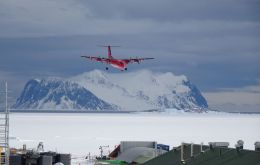
RRS Sir David Attenborough departed Rothera Research Station for the final time earlier in May and is now making its way back to the UK, marking the end of the BAS Antarctic summer field season.
-
Saturday, May 21st 2022 - 09:50 UTC
Endurance Conquered: A conversation with Mensun Bound, Director of Exploration of the Endurance22 project
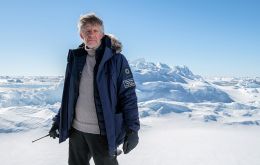
By Sean Kingsley for Wreckwatch magazine* – Mensun Bound is a fifth-generation Falkland Islander, born to the sea and its mysteries. By fusing academia with firing the public imagination, he creates buzz after buzz around underwater archaeology. In the 1980s he set up and directed Oxford University MARE, England’s first academic maritime archaeological unit, and in 1994 was appointed the Triton Fellow in Maritime Archaeology at St Peter’s College, Oxford.
-
Saturday, May 21st 2022 - 08:55 UTC
BAS contributing to Antarctica's dynamic mapping and geographic information
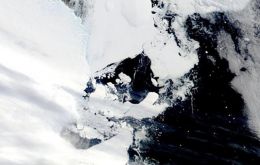
The latest British Antarctic Survey (BAS) Antarctic Digital Database (ADD) data will be included in a world leading collection of geographic information. ADD is a compilation of the best available topographic data for Antarctica. It is managed by BAS’ Mapping and Geographic Information Centre (MAGIC) on behalf of The Scientific Committee on Antarctic Research and is an essential tool for researchers navigating and understanding Antarctica’s ever changing landscape.
-
Saturday, April 23rd 2022 - 10:19 UTC
New BAS aircraft to ensure transport between Falklands and Antarctica

The British Antarctic Survey has signed a contract for a replacement aircraft to ensure transport between the Falkland Islands or South America to the research station at Rothera, Antarctica. The contract was signed by Professor Dame Jane Francis, Director of BAS, Nigel Bird, Director of Major Programs at UK Research and Innovation (UKRI) and Brian Love, Chief Commercial Officer, Field Aerospace
-
Wednesday, October 27th 2021 - 14:04 UTC
BAS and WWF invite the public to work on a “Walrus from Space” census

British Antarctic Survey (BAS) and WWF are seeking the public’s help to search for walrus in thousands of satellite images taken from space, with the aim of learning more about how walrus will be impacted by the climate crisis. It’s hoped half a million people worldwide will join the new “Walrus from Space” research project, a census of Atlantic walrus and walrus from the Laptev Sea, using satellite images provided by space and intelligence company Maxar Technologies’ DigitalGlobe.
-
Tuesday, October 19th 2021 - 09:09 UTC
Humpback whales recovering on their feeding grounds in the South Atlantic
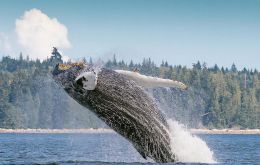
Humpback whale populations are strongly recovering on their feeding grounds in the South Atlantic, with over 24,543 whales now estimated to use polar waters in the Scotia Arc each summer.
-
Friday, October 8th 2021 - 09:10 UTC
Falklands' decisive in supplying Covid-19 vaccines to BAS Antarctic base Rothera
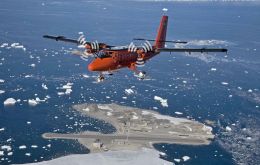
The BBC has reported that nine months after it was rolled out, the AstraZeneca Covid vaccine has finally reached the Antarctic. It was flown in, via the Falkland Islands, this week to immunize the 23 staff members who've been keeping the British Antarctic Survey, BAS, Rothera research base running through the polar winter.
-
Friday, October 1st 2021 - 09:12 UTC
FIG and BAS work together on forthcoming Antarctic summer research season
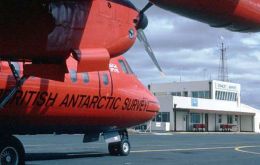
Despite the global pandemic, the strong strategic relationship between the Falkland Islands Government (FIG) and British Antarctic Survey (BAS) has gone from strength to strength. Following the success of the previous austral summer research season, the Falkland Islands is once again positioned to be the gateway for exciting and important Antarctic science over the next six to nine months.
-
Wednesday, August 18th 2021 - 09:12 UTC
Plastic pollution and ocean acidification reduce Antarctic krill development, BAS research
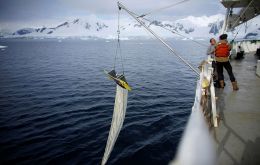
Plastic pollution combined with ocean acidification hinders the development of Antarctic krill in the Southern Ocean, research published in Marine Frontiers reveals.
-
Saturday, June 26th 2021 - 09:40 UTC
HMS Protector makes history: sails further north than any other Royal Navy ship
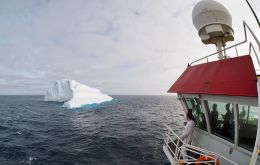
Icebreaker HMS Protector sailed closer to the North Pole than any other Royal Navy ship in history on her first patrol of the Arctic. The survey and research ship crunched her way through polar ice to within 1,050 kilometres of the top of the world as she gathered data about the ocean and environment.
